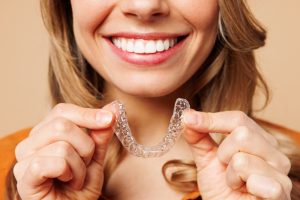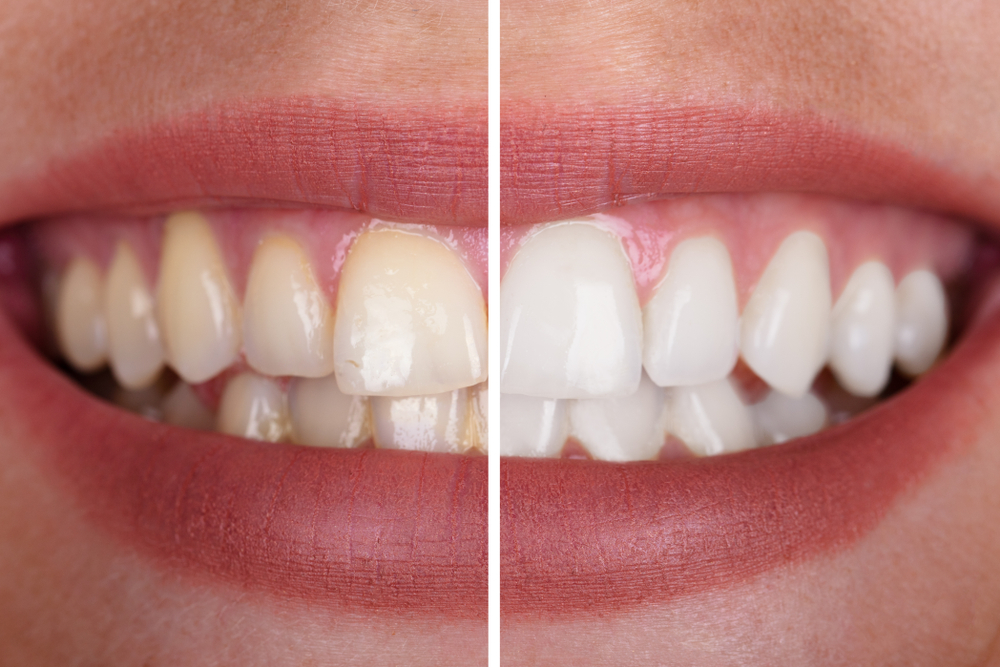When it comes to dentures, many people are unaware they have two choices: traditional dentures and implant-supported dentures. Traditional dentures are removable and often require the use of adhesives to stay in place. On the other hand, implant-supported dentures are permanent fixtures that are attached directly to the jawbone using dental implants. This type of denture offers greater stability, comfort, and aesthetics than traditional dentures.
Our dental team will explore the differences between traditional dentures and implant-supported dentures. We’ll explain how the process of implanting dental implants works to help you decide which type of dentures is right for you.
Three Ways Implant-Supported Dentures Differ From Traditional Dentures
There are three main ways these two types of dentures differ from each other.
1) Support
Traditional dentures rest on the gums and are held in place by adhesives, while implant-supported dentures are secured by dental implants. Dental implants are small titanium posts. They are surgically inserted into the jawbone to act as artificial tooth roots. Titanium is very strong, lightweight, and integrates easily with your jawbone. Implants are much more stable than your gums and less irritating over the long term.
2) Stability
With traditional dentures, the wearer may experience slipping or shifting of the dentures while eating or speaking. Implant-supported dentures eliminate this issue and provide a more natural feeling when talking or eating. Without slipping or shifting, you have greater comfort as you go about your normal day. You also don’t have to worry about whether your teeth are going to shift suddenly.
3) Stronger Jaws
Implant-supported dentures also have the advantage of preserving jawbone density, which can deteriorate over time due to the absence of natural teeth. This is because the implants stimulate the jawbone and prevent bone loss.
Next, we’ll go into the process of implanting the base of these types of dentures.
Implanting the Posts of Implant-Supported Dentures
Getting your mouth ready for implant-supported dentures takes longer than traditional dentures. But the long-term results can be well worth it.
The initial processes are the same, including a comprehensive dental exam, X-rays, and extracting any decayed or missing teeth to make room for dentures. But the main difference here is that implant-supported dentures require oral surgery.
After your dentist confirms you’re a candidate for implant-supported dentures, they will review the process with you. There will be a few steps where healing is required before the implants are surgically put into your jawbone. Until you get your permanent dentures, you’ll be given temporary ones to eat and go about your normal routine.
The surgery to place these implants typically takes several hours and may require sedation to keep you comfortable. Your dentist will create small incisions in your gum tissue to access the jawbone and then carefully drill holes to place the implant posts.
After the implants have been placed, you will need to wait several months for a process called osseointegration to occur. During this time, your jawbone will gradually fuse to the titanium posts, creating a solid and stable anchor for your dentures.
Once osseointegration is complete, your dentist will attach a connector called an abutment to each implant post. This abutment serves as the link between the implant and your dentures, allowing them to snap firmly in place.
Finally, your dentures will be custom-crafted to fit securely over the abutments. Depending on the type of implant-supported denture you choose, you may need multiple implants to support a complete set of teeth.
Osseointegration and Implant-Supported Dentures
One of the most critical aspects of implant-supported dentures is osseointegration. Osseointegration refers to the process by which the dental implant fuses with the jawbone, creating a stable foundation for the denture to attach.
During osseointegration, the dental implant acts as a replacement for the tooth root, stimulating the surrounding bone tissue to grow around it. This process takes several months to complete and requires a great deal of patience on your part. You’ll have temporary dentures while osseointegration takes place.
While the process may take some time, the benefits are well worth the wait. Implant-supported dentures offer a level of stability, comfort, and security that traditional dentures simply cannot match. They do not require adhesives or clasps to hold them in place, allowing you to speak and eat with confidence.
Types of Materials Used for Implant-Supported Dentures
When it comes to choosing materials for implant-supported dentures, there are a few options to consider. Traditional dentures are generally made of acrylic, a type of plastic. Implant-supported dentures come in three main types of materials.
1. Acrylic
This is the most commonly used material for denture bases because it’s lightweight, durable, and easily moldable. Acrylic is also affordable, making it an excellent choice for many patients.
2. Porcelain
This material is often used for the teeth in implant-supported dentures. It’s highly durable, looks like natural teeth, and resists stains. Porcelain has a higher cost, but it’s a good investment for patients looking for a long-lasting and natural-looking smile.
3. Zirconia
Zirconia is a newer material that’s gaining popularity for its strength and durability. It’s resistant to cracks and chips, making it a good choice for patients who tend to grind their teeth. Zirconia is also biocompatible, meaning it won’t irritate the gums or cause an allergic reaction.
Your dentist will be happy to discuss your options regarding the material for your implant-supported dentures.
We Want You to Have the Best Smile
Our doctors and staff want you to have the best, most confident smile possible. We have four doctors on staff, Dr. Fannin, Dr. Dills, Dr. Hall, and Dr. Sponenberg, who are all highly qualified and experienced with implant-supported dentures. Any one of them can help you if you’re interested in this dental innovation to give you better comfort for many years to come.
Contact us or call (417) 887-1220 for more information on implant-supported dentures!




